Papers by Derrick C Darden
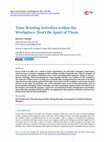
Social Science Research Network, 2015
If you work in an office for a small or large organization, you will notice managers, supervisors... more If you work in an office for a small or large organization, you will notice managers, supervisors, and even your co-workers engaging in time-wasting activities during the day. Typical examples of such activities are talking around the water cooler spreading office gossip or sitting in non-productive meetings. These non-productive, time-wasting activities are common in the workplace. The objective of this article is to help you to identify time-wasting behaviors and what to do about them based on information gathered through observations in the workplace and recent research articles on the topic. In particular, the article identifies three areas of non-productivity such as preoccupation, attending useless meetings, and time-consuming communication unrelated to office business. For both the manager, supervisor and individual worker identification and elimination of the time-wasting activity can foster an organization that promotes efficiency and increases productivity with increase profitability.
Social Science Research Network, 2012
Is Praise Always a Good Thing?
Social Science Research Network, 2012
ABSTRACT Is it detrimental to praise a child for their intelligence or abilities? As a society we... more ABSTRACT Is it detrimental to praise a child for their intelligence or abilities? As a society we tend to praise and show admiration of our young for their intelligence or abilities. The problem with praising a child is not the act, but how it’s conveyed and how it’s delineated to the individual child. Praising a child for their intelligence and not for their effort or hard work will harm them emotionally in the future. By praising a child for their ability you are opening them up to not only potential failure, but disappointment should they not be as successful the next time around. Praising a child for their ability draws attention to them and makes a big deal of the accomplishment, regardless of whether it is from effort or intelligence and ability.
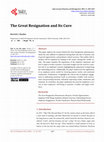
Open Journal of Business and Management, 2023
This paper explores the reasons behind the Great Resignation phenomenon, which has seen millions ... more This paper explores the reasons behind the Great Resignation phenomenon, which has seen millions of employees leaving their jobs due to burnout, lack of growth opportunities, and pandemic-related concerns. This sudden shift in mindset will be explained by looking at the trends causing this worker exodus. The paper examines the importance of the employee experience and how it impacts worker retention. It provides insights into the need for a positive start to an employee's journey, highlighting the importance of improving the onboarding process. Additionally, the paper underscores the significance of an employee-centric model for fostering passion, loyalty, and emotional connections. Furthermore, it highlights the critical role of employee engagement in addressing emotional needs in promoting a healthy work environment and preventing burnout, ultimately improving worker satisfaction and retention. In conclusion, the paper emphasizes the need for employers to invest in their employees' well-being to maintain a healthy and happy workforce.
Diversity in the Workplace
Social Science Research Network, 2012
ABSTRACT Most believe and understands that diversity brings more talent to an organization, incre... more ABSTRACT Most believe and understands that diversity brings more talent to an organization, increases creativity and perhaps leads to higher retention rates. But, in a global economy are organizations buying into the diversity and inclusion concept? And have organizations made progress in recruitment and retention of diverse ethnic groups in their organizations?
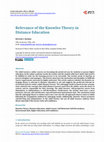
Creative Education, 2014
For adult learners, online courses are becoming the preferred way for students to pursue higher e... more For adult learners, online courses are becoming the preferred way for students to pursue higher education. In the online academic world, the teacher and the student alike have duties that need to be fulfilled in order for the learning process to be successful. The teacher needs to function as process designers and managers. The learner must have the motivation and discipline to fulfill the course requirements and must be highly motivated. This article explores whether the Knowles andragogy theory is relevant to distance education or not and suggests the preferred relevant instructional style for today's adult distance learner. The andragogy model is based on four assumptions related to the concepts that adult distance learners must have the ability, need, the desire to control, and be responsible for their learning. The adult learners' self-prospective moves from dependency to independency or self-directedness. Furthermore, the teacher must have a more practical, relevant, and self-directive and self-motivated instructional style. The conclusion found that the andragogy theory is relative and is not a one-size-fits-all approach when it comes to adults following the assumptions outlined by andragogy model. Additionally, Knowles' theory promotes self-directing and independence in the adult learner, but not all adult learners embrace these ideals especially if the learner lacks self-confidence.
The Great Resignation and Its Cure
Open Journal of Business and Management
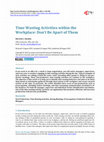
SSRN Electronic Journal, 2015
If you work in an office for a small or large organization, you will notice managers, supervisors... more If you work in an office for a small or large organization, you will notice managers, supervisors, and even your co-workers engaging in time-wasting activities during the day. Typical examples of such activities are talking around the water cooler spreading office gossip or sitting in non-productive meetings. These non-productive, time-wasting activities are common in the workplace. The objective of this article is to help you to identify time-wasting behaviors and what to do about them based on information gathered through observations in the workplace and recent research articles on the topic. In particular, the article identifies three areas of non-productivity such as preoccupation, attending useless meetings, and time-consuming communication unrelated to office business. For both the manager, supervisor and individual worker identification and elimination of the time-wasting activity can foster an organization that promotes efficiency and increases productivity with increase profitability.
Is Praise Always a Good Thing?
SSRN Electronic Journal, 2012
ABSTRACT Is it detrimental to praise a child for their intelligence or abilities? As a society we... more ABSTRACT Is it detrimental to praise a child for their intelligence or abilities? As a society we tend to praise and show admiration of our young for their intelligence or abilities. The problem with praising a child is not the act, but how it’s conveyed and how it’s delineated to the individual child. Praising a child for their intelligence and not for their effort or hard work will harm them emotionally in the future. By praising a child for their ability you are opening them up to not only potential failure, but disappointment should they not be as successful the next time around. Praising a child for their ability draws attention to them and makes a big deal of the accomplishment, regardless of whether it is from effort or intelligence and ability.
SSRN Electronic Journal, 2012
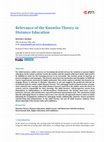
Creative Education, 2014
For adult learners, online courses are becoming the preferred way for students to pursue higher e... more For adult learners, online courses are becoming the preferred way for students to pursue higher education. In the online academic world, the teacher and the student alike have duties that need to be fulfilled in order for the learning process to be successful. The teacher needs to function as process designers and managers. The learner must have the motivation and discipline to fulfill the course requirements and must be highly motivated. This article explores whether the Knowles andragogy theory is relevant to distance education or not and suggests the preferred relevant instructional style for today's adult distance learner. The andragogy model is based on four assumptions related to the concepts that adult distance learners must have the ability, need, the desire to control, and be responsible for their learning. The adult learners' self-prospective moves from dependency to independency or self-directedness. Furthermore, the teacher must have a more practical, relevant, and self-directive and self-motivated instructional style. The conclusion found that the andragogy theory is relative and is not a one-size-fits-all approach when it comes to adults following the assumptions outlined by andragogy model. Additionally, Knowles' theory promotes self-directing and independence in the adult learner, but not all adult learners embrace these ideals especially if the learner lacks self-confidence.
The impact of transformational leadership styles among minority leaders in the federal government
The impact of transformational leadership styles among minority leaders in the federal government
Diversity in the Workplace
SSRN Electronic Journal, 2000
ABSTRACT Most believe and understands that diversity brings more talent to an organization, incre... more ABSTRACT Most believe and understands that diversity brings more talent to an organization, increases creativity and perhaps leads to higher retention rates. But, in a global economy are organizations buying into the diversity and inclusion concept? And have organizations made progress in recruitment and retention of diverse ethnic groups in their organizations?
According to the author of "Rumors and Rumor control: A Manager's Guide to Understanding and Comb... more According to the author of "Rumors and Rumor control: A Manager's Guide to Understanding and Combating Rumors,” Kimmel (2004), writes that rumors usually appear either through situations of extreme stress, mistrust and confusion. Further, rumors can also thrive on these irrelevant facts or die a slow death when the crisis has subsided. Bottom-line is that rumors are unsubstantial claims they’re inaccuracy, mistaken beliefs and misconception. Rumors, causes high anxieties when people have uncertainty with ambiguity. The paper will explain the benefit and the liabilities of rumors.
If you work in an office for a small or large organization, you will notice managers, supervisors... more If you work in an office for a small or large organization, you will notice managers, supervisors, and even your co-workers engaging in time-wasting activities during the day. Typical examples of such activities are talking around the water cooler spreading office gossip or sitting in non-productive meetings. These non-productive, time-wasting activities are common in the workplace. This paper’s objective is to help you to identify time-wasting behaviors and what to do about them, based on information gathered through observations in the workplace and recent research articles on the topic. In particular, the paper identifies three areas of non-productivity: preoccupation and not focused on the task at hand, attending useless meetings, and time-consuming communication unrelated to office business. The paper also identifies the time frames during which time-wasting activities occur.
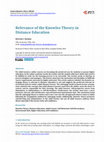
Creative Education, Jun 2014
For adult learners, online courses are becoming the preferred way students pursue higher educatio... more For adult learners, online courses are becoming the preferred way students pursue higher education. In the online academic world, the teacher and the student alike have duties that need to be fulfilled in order for the learning process to be successful. The teacher needs to function as process designers and managers. The learner must have the motivation and discipline to fulfill the course requirements and must be highly motivated.
This article explores whether the Knowles andragogy theory is relevant to distance education or not and suggests the preferred relevant instructional style for today’s adult distance learner.
The andragogy model is based on four assumptions related to the concepts that adult distance learners must have the ability, need, the desire to control, and be responsible for their learning. The adult learner self-prospective moves from dependency to independency or self-directedness.
Furthermore, the teacher must have a more practical, relevant, and self-directive and self-motivated instructional style.
The conclusion found that the andragogy theory is relative and is not a one-size-fits-all approach when it comes to adults following the assumptions outlined by andragogy model. Additionally, Knowles’ theory promotes self-directing and independence in the adult learner, but not all adult learners embraces these ideals especially if the learner lacks self-confidence.
Drafts by Derrick C Darden
Leaders in the present day live in a world of random and unexplored happenings; they live in cons... more Leaders in the present day live in a world of random and unexplored happenings; they live in constant worry about the next hours or day events. They fear that when they move into the office, or answer their mobile phones, or go online, a bombshell might be waiting that would force them to reconsider their entire business. It might be a global economic uncertainty, limited sustainability of the current market or profit model, or even a global pandemic like Ebola, SARS, and the present-day Coronavirus (Covid-19) as a leader one is always prepared and accustomed to dealing with these challenges.







Uploads
Papers by Derrick C Darden
This article explores whether the Knowles andragogy theory is relevant to distance education or not and suggests the preferred relevant instructional style for today’s adult distance learner.
The andragogy model is based on four assumptions related to the concepts that adult distance learners must have the ability, need, the desire to control, and be responsible for their learning. The adult learner self-prospective moves from dependency to independency or self-directedness.
Furthermore, the teacher must have a more practical, relevant, and self-directive and self-motivated instructional style.
The conclusion found that the andragogy theory is relative and is not a one-size-fits-all approach when it comes to adults following the assumptions outlined by andragogy model. Additionally, Knowles’ theory promotes self-directing and independence in the adult learner, but not all adult learners embraces these ideals especially if the learner lacks self-confidence.
Drafts by Derrick C Darden
This article explores whether the Knowles andragogy theory is relevant to distance education or not and suggests the preferred relevant instructional style for today’s adult distance learner.
The andragogy model is based on four assumptions related to the concepts that adult distance learners must have the ability, need, the desire to control, and be responsible for their learning. The adult learner self-prospective moves from dependency to independency or self-directedness.
Furthermore, the teacher must have a more practical, relevant, and self-directive and self-motivated instructional style.
The conclusion found that the andragogy theory is relative and is not a one-size-fits-all approach when it comes to adults following the assumptions outlined by andragogy model. Additionally, Knowles’ theory promotes self-directing and independence in the adult learner, but not all adult learners embraces these ideals especially if the learner lacks self-confidence.